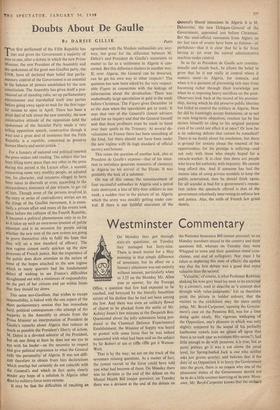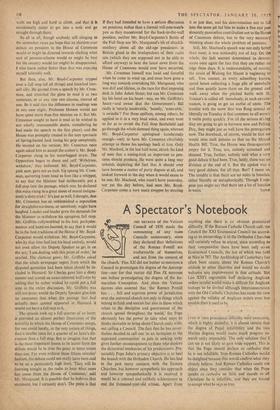Westminster Commentary
ON Monday they got through sixty-six questions; on Tuesday they managed but forty-nine. There is much matter for a May morning in that simple, difference of seventeen, but its effect on a January afternoon was not entirely without interest, particularly when. at 3.25 on the Monday Mr. Allen rose to answer, for the Foreign Office, a question that few had expected to be reached, and betrayed by the literally breathless nature of his diction that he had not been among the few. And there was even an unlikely flower of charm to be plucked from the nettle of Mr. Aubrey Jones's few minutes at the Despatch Box. Questioned about the jolly substances being pro- duced at the Chemical Defence Experimental Establishment, the Minister of Supply was heard to protest with some force that he was indeed acquainted with what had been said on the subject by Sir Robert er um er riffle riffle got it Watson- Watt.
That is by the way; we are on the track of the seventeen missing questions. As a matter of fact, the rawest recruit to the force could have told you what had become of them. On Monday there was no division at the end of the debate on the Mental Health Bill (major premiss); on Tuesday there was a division at the end of the debate on the National Insurance Bill (minor premiss); so on Monday members stayed in the country and their questions fell, whereas on Tuesday they were Whipped to town and their questions stood (con- clusion, and end of syllogism). Nor must I be taken as deploring this state of affairs; the upshot Was that the first debate was a good deal more valuable than the second.
'Valuable,' of course, is what Professor Robbins, shaking his wise grey head (so soon to be encircled by a coronet), used to describe as 'a concept shot through with value-judgments.' Let us therefore paint the picture in bolder colours, that the visitors to the exhibition may the more easily judge. Mr. Boyd-Carpenter, opening the Govern- ment's case on the Pensions Bill, was for a time doing quite nicely. His vigorous walloping 'of the Opposition, one's pleasure in which was only slightly tempered by the sound of his perfectly loathsome vowels (can we please all agree that there is no such year as nointeen-lifty-noine?), had little enough to do with pensions, it is true; but as party politics go it was a cut above the usual level, for Spring-heeled Jack is one who neither asks ,nor grants quarter, and believes that if the atity of an. Opposition is to harry the Government into the grave, there is no reason why one of the pleasanter duties of the Government should not be to do a little counter-harrying of its own. More- over, Mr. Boyd-Carpenter knows that the orchard walls are high arid hard to climb, and that it is occasionally easier to get into a tank and go straight through them.
So all in all, though anybody still clinging to the somewhat vieux jeu hope that an election-year debate on pensions in the House of Commons would or might be directed towards eliciting what sort of pension-scheme would or might be best for the country would (or might) be disappointed, I who know rather better than that was enjoying myself tolerably well.
But then, alas, Mr. Boyd-Carpenter tripped over a full stop (of all things) and knocked him- self silly. He quoted from a speech by Mr. Cross- man, and stretched the gloss to read it as two sentences, or at any rate two clauses, instead of one. Be it said that the difference in readings was in any case slight; Professor Hotson would not have spent more than five minutes on it. But Mr. Crossman sought to have it read as he wished (a not wholly unreasonable desire, considering he had made the speech in the first place), and the House was promptly treated to the nare spectacle of Spring-heeled Jack losing his grip completely. He insisted on his version; Mr. Crossman once again asked him to accept the author's. Mr. Boyd- Carpenter clung to his waterlogged straw. The Opposition began to shout and yell; 'Withdraw, withdraw,' they bellowed. Mr. Boyd-Carpenter, pink now, gave not an inch. Up sprang Mr. Cross- man, quivering from head to foot like a whippet, to say that the Minister had deliberately put a full stop into the passage, which was, he declared (his voice rising to a great shout of moral indigna- tion) 'a dirty trick 1' It's just as well, I thought, that Mr. Crossman has so unblemished a reputation for straightforwardness, or somebody might have laughed. Louder and louder grew the demands for the Minister to ,withdraw his egregious full stop; Mr. Griffiths collywobbled to his feet, pachyder- matous and hand-on-hearted, to say that it would be in the best traditions of the House if Mr. Boyd- Carpenter would withdraw. Mr. Boyd-Carpenter, who by that time had lost his head entirely, would not even allow. the Deputy Speaker to get in on the act; 'I am dealing with this point of order,' he snarled. The clamour grew; Mr. Griffiths asked that the whole newspaper report from which the disputed quotation had been taken should be in- cluded in Hansard; Sir Charles gave him a dusty answer and scored an unaccustomed bull's-eye by adding that he rather wished he could put a full stop in the entire discussion. Mr. Griffiths was still not done; would the Deputy Speaker give him an assurance that svhen ,the passage that had actually been quoted appeared in Hansard it would not have a full stop in it.
The episode took- up A full quarter of an hour; it provided .an almost perfect illustration of the triviality to which the House of Commons stoops, for one could hardly, in the very nature of things, find a smaller issue for a quarter of an hour's dis- cussion than a full stop. But to imagine that that is the most important lesson to be learnt from the debate would be to miss the point in more senses than one. For even without those fifteen minutes' bedlam, the debate could not really have been said to be on a particularly high level. 'They will be listening tonight to the radio to hear *hat news has come from the House of Commons,' said Mr. Marquand. It is possible that he believes that statement, but I certainly don't, The point is that if they had intended to have a serious discussion on pensions, rather than a formal will-you-won't- you as they manoeuvred for the back-to-the-wall position, neither Mr. Boyd-Carpenter's Battle of the Full Stop nor Mr. Marquand's bit of chuckit- smithery about all the old-age pensioners in Britain glued to the loudspeakers of their radio sets (which they are supposed not to be able to afford anyway) to hear the latest news from the House of Commons would ever have occurred.
Mr. Crossman himself was lucid and forceful when he came to wind up, and must have gone a long way towards overtaking Mr. Marquand, who was dull and lifeless, in the race for that imposing desk in John Adam Street; but can Mr. Crossman lay his hand on his heart—nay, on Mr. Griffiths's heart—and swear that the Government's Bill really is 'utterly intolerable,' beastly,"miserable,' 'a swindle"? For those epithets, among others, he applied to it in a very loud voice, and even went so far as to revisit the Full Stop Battlefield' and go through the whole damned thing again, whereat Mr. Boyd-Carpenter apologised handsomely enough—only to have Mr. Crossman churlishly attempt to throw his apology back at him. Only Mr. Macleod, in the last half-hour, struck the kind of note that a tuning-fork as important as pen- sions should produce. He went quite a long way towards deploring 'the fact that it should ever have become a matter of party dispute at all, and looked forward to the day when it would cease to be one. Mr. Macleod, who wasn't born yesterday, nor yet the day before, had seen Mr. Boyd- Carpenter come a very nasty cropper by treating it as just that, and his determination not to fall into the same pit led him to make a line and pas- sionately passionless contribution not to the House of Commons debate, but to the very necessary thinking about the whole problem of pensions.
Still, Mr. Macleod's speech was not only better than most; it was noticeably out of key. On the whole, the lads seemed determined to demon- strate once again the fact that they are rather on edge these days. It is understandable, of course; the strain of Waiting for Macot is beginning to tell. You cannot, as every schoolboy knows, spend hours collecting a huge pile of snowballs and then quietly leave them on the ground and walk away when the pitched battle with St. Trinian's is called off. Somebody, in such circum- stances, is going to get an earful of snow. The trouble with the snow that was flung around so liberally on Tuesday is that common to all snow: it melts pretty quickly. For all the serious ski-ing they are going to get in between now and Polling Day, they might just as well have the prorogation now. The 'drawback, of course, would be that we would miss such debates as that on the Mental Health Bill. True, the House was three-quarters empty for it. True, too, nobody screamed and shouted. True, further, nobody said what a very good debate it had been. True, lastly, there was no division at the end of it. But the upshot was a very good debate, for all that. But? I mean so. The trouble is that there are 'no votes in lunatics, either literally or metaphorically. Though I sup- pose you might say'that there are a lot of lunatics











































 Previous page
Previous page